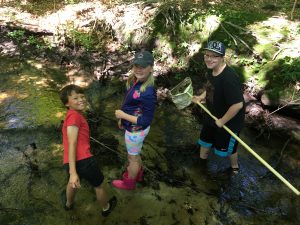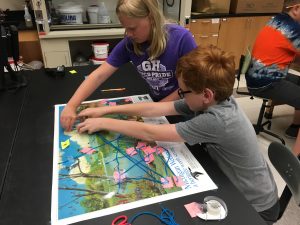By Susan Ipri Brown and Shana McCrumb, Hope College

“We need to have a vision of the world we want to create so that we can see ourselves as collaborators with future generations in the project of shaping it.” – Dr. David Grinspoon “Think of your kids and live sustainably.” How often do we hear such statements as a call to action for embracing sustainable practices?
But at the same time that we embrace this call, are we training this generation to take on the mantle from us? Let’s engage them in shaping their future. Let’s train them to directly act. Empower them, not lecture them. Let’s guide them, teach them how to jump in, how to ask questions, how to let their curiosity lead.
Classroom teachers continually find innovative ways to integrate sustainability based questions and curiosity into their curriculum. Many are using air quality monitors in their science and math classes to create hands-on experiences by collecting authentic environmental data, learning how to draw conclusions and asking further questions from those experiences.
At Hope, new funding from Pepsico will inspire composting and waste reduction habits in our college students and summer campers.
Summer adds an additional time to let our students explore, ask questions, and see the relevancy of their decisions to their environment. This summer, look for camps and outdoor adventures that immerse your student in an authentic study of the environment, that lets their curiosity lead to discovery. Relevancy is empowerment.
 We’ve employed these principles in several new and revised camps at Hope’s Summer Science Camps: Exploring Ecosystems for students entering grades 3-8, EnviroCaching for grades 4-8 and Experimental Design for grades 10-12. (Thanks to support from the Environmental Education Division of ASME, International and to materials from the MSU Extension!)
We’ve employed these principles in several new and revised camps at Hope’s Summer Science Camps: Exploring Ecosystems for students entering grades 3-8, EnviroCaching for grades 4-8 and Experimental Design for grades 10-12. (Thanks to support from the Environmental Education Division of ASME, International and to materials from the MSU Extension!)
Exploring Ecosystems, a hands-on, nature-based camp, enriches students’ natural understanding of the ecology of local ecosystems. Through observation, data collection and analysis, students will gain an understanding of how organisms interact with other organisms and the abiotic environment to form an ecosystem.
EnviroCaching is an environmental themed camp with a twist. Combining the idea of geocaching with environmental science themes, students will use tablets loaded with a GPS application to orient to given coordinates. At each coordinate, they complete exploration activities.
Experimental Design puts students into the world of research labs and high-tech investigations. They’ll learn first-hand research techniques, lab protocols and data analysis. Focusing on biofuel development, students will explore how new fuels are developed, visit an active agricultural research station, and perform their own experiments.
![]() Students are naturally curious about the environment and the interactions within nature. Whether it’s a camp, a camping trip, or a long walk on a beautiful summer evening, make your outdoor adventure the spark of learning and empowerment.
Students are naturally curious about the environment and the interactions within nature. Whether it’s a camp, a camping trip, or a long walk on a beautiful summer evening, make your outdoor adventure the spark of learning and empowerment.
Professors Susan Ipri Brown and Shana McCrumb are directors of ExploreHope academic outreach programs at Hope College, including the extensive Summer Science Camps.
![]() This Week’s Sustainability Framework Theme
This Week’s Sustainability Framework Theme
Community Knowledge: The collective knowledge and energy of the community is an incredible resource that must be channeled to where it is needed.
![]() ABOUT THIS SERIES
ABOUT THIS SERIES
Living Sustainably is a collection of community voices sharing updates about local sustainability initiatives. It is presented by the Holland-Hope College Sustainability Institute, a joint project of Hope College, the City of Holland and Holland Board of Public Works. Go to www.hope.edu/sustainability-institute for more information.

